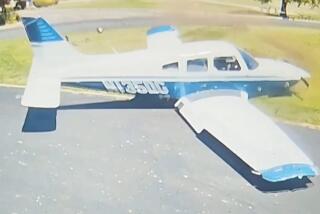The City Gets a $2.8-Million Golf Lesson : Liability: That’s how much L.A. will pay a trucker who suffered brain damage when struck by a ball. Wayward shots from city-run course have been landing on the Golden State Freeway for years.
- Share via
As if random shootings, multicar pileups and spilled truckloads weren’t enough, Los Angeles’ frazzled freeway drivers must now add wayward golf balls to their list of potential hazards.
Travelers on the Golden State Freeway have reported more than 100 cases of misdirected tee shots sailing into traffic from the popular Harding Golf Course in Griffith Park in the last seven years, and it is widely believed that thousands of other sliced shots have gone unreported.
The balls, launched from the public course’s notorious 12th hole, have been blamed for a variety of accidents and minor injuries. Most are resolved out of court by the city Recreation and Parks Department, which runs Harding.
A more serious incident was resolved this week when the city attorney agreed to a multimillion-dollar settlement with a truck driver who suffered brain damage when a ball crashed through his window and smashed into his head.
Joseph Coutts, 35, received nearly $800,000 cash and guaranteed lifetime payments totaling more than $2 million in a Los Angeles Superior Court settlement tentatively reached Tuesday. Coutts’ attorney, John F. Murphy, said the Burger King deliveryman suffered mild brain dysfunction and seizure disorders as a result of the 1987 accident.
“He was driving an 18-wheel (tractor-trailer rig),” Murphy said. “The ball went through his right window, struck him in the forehead, knocked him out and rendered him unconscious.”
Murphy said that, in researching the case, he was surprised to learn how frequently golf balls come whizzing into traffic from the course. One woman, for example, complained of her car being hit on two separate occasions. The Parks Department’s complaint log contains such comments as: “Golf ball struck motorist on jaw,” “Glass fragments on passengers, will cause fatal accident someday,” and “Serious hazard--like having rifle range on freeway.”
“It’s the kind of a thing that makes you mad when you hear about it,” Murphy said. “It seems as though they’re more concerned about the aesthetics of the course than the safety of motorists.”
Park officials acknowledged Friday that the 12th hole lies within duffer’s range of the southbound lanes of the Golden State Freeway near the Ventura Freeway interchange, but they deny that the hazard has been ignored.
Sheldon Jensen, assistant general manager of the Parks Department, said the entire 350-yard fairway runs parallel to the freeway, making it tough to prevent hackers from slicing over the green and into the path of traffic. He traced the problem back to the 1960s, when the Golden State Freeway was built just 50 yards from the fairway.
Officials have taken several whacks at the problem. They erected a transparent 55-foot-tall fence that runs half the length of the green on the freeway side. Trees and vegetation also were planted. Last year, they even moved the tee to a lower plot of ground and altered the hitting angle away from the freeway.
Jensen said those measures have greatly reduced the number of balls landing in traffic, from a high of about 40 a week several years ago to no more than one or two a week now. But he and other park officials added that the only sure way to eliminate the threat is to ban bad golfers.
“That’s the best we can do,” Jensen said. “There’s no land available for redesigning the course. Plus, we can never say it’s 100% safe, because golfers hit some pretty crazy shots.”
More than 98,000 rounds of golf were played at the course last year. One golfer said traffic passes so close to the fairway that it’s possible to read bumper stickers between shots. Others see the freeway as a major hindrance, not only for the dangers posed by errant shots but for the constant din of roaring engines. Hitting into traffic is a two-stroke penalty.
“Guys will choke up sometimes because they’re so afraid of hitting one over the fence. It changes your game,” said Ken Dare, a course regular. “You’re not going to risk putting a ball through someone’s windshield just to hit it an extra 20 yards.
“The fence could be 1,000 feet high,” he said, “and there would still be some guy who would hit it over.
“And there’s no point in yelling, ‘Fore!’ because no one can hear you.”
More to Read
Sign up for Essential California
The most important California stories and recommendations in your inbox every morning.
You may occasionally receive promotional content from the Los Angeles Times.













